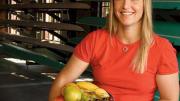“I was a fat kid,” says Barbara Ruhs. “My sister was a French fry, and I was a beachball. I always wanted to be a French fry.” In eighth grade, her body dramatically reshaped itself when she began riding her bicycle everywheredelivering newspapers and pedaling five miles to school on Long Islandwhile playing volleyball, running track, and becoming the top tennis player on the school team.
In 1995, Ruhs graduated from Cornell, a varsity athlete in both tennis and crew. Today, she’s an upbeat, bona fide jock who rows, plays tennis, golfs, and bicycles year-round to work, where, as a clinical dietitian at the University Health Services, she is Harvard’s first sports nutritionist. Since 2003, Ruhs has advised varsity athletes, as many as 130 per semester. “A lot of my work is refereeing bad nutrition advice,” she says. “Like low-carb diets. That’s nutritional suicide for an athlete, who typically needs to consume a higher percentage of calories from carbohydrates.” Performance issues include the timing of mealssay, for a runner about to race; safe weight loss for lightweight rowers, coxswains, and football players; and hydration strategies“An athlete can’t perform optimally if even 1 percent dehydrated.” Ruhs “fell in love with nutrition” at Cornell and earned a master’s degree in the field at Boston University. She spent four years as statewide coordinator for nutrition education in Massachusetts and then launched her own business, Neighborhood Nutrition, in 2001 to bring the message to the grass roots. “I’m not the food police,” she says; in fact, her 17-year-old cat is named for a candy bar: Chunky. “I’m practical,” Ruhs adds. “Sometimes even a nutritionist eats pizza at midnight!”






